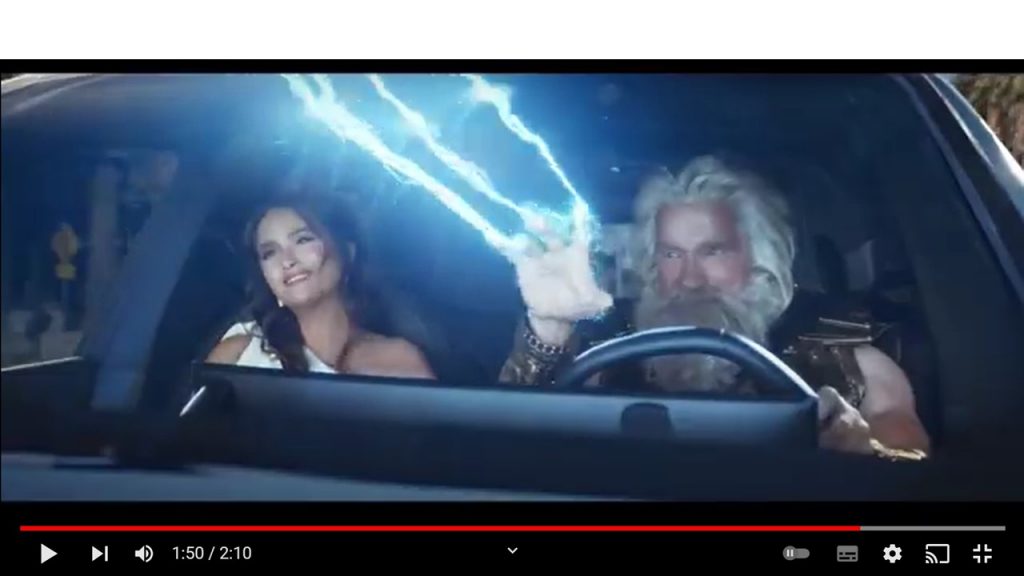On February 13, 2022, an automaker took advantage of the prime space of the LVI Super Bowl edition, the super-event of the American football decider, to showcase its brand new all-electric vehicle.

The commercial stars world-renowned actors Arnold Schwarzenegger as Zeus, the god of thunder, and Salma Hayek as the goddess Hera of birth and marriage, the queen of Olympia.
In the 60-second ad, the couple sits happily on the road in their new vehicle as Zeus uses his electric power to change traffic lights to green clearing the way.
Electric vehicles, especially cars, are an important part of the solution to decarbonising the energy matrix, but in real life, however, the electric source is not magically available like that.
Among the points I highlight are the importance of certifying the origin and green destination of batteries, in addition to the necessary investment in infrastructure to ensure the autonomy of electric vehicles.
In the articles “The solution of advanced biofuels in counterpoint to the use of electric cars (part 1 and 2)”, I highlight the importance of putting a magnifying lens on the adoption of electric cars as an alternative to replace those powered by fossil diesel as a green and clean solution.
Cost of transition
The McKinsey Global Institute study translates to real-world plan the giant size of a transformation of the global economy needed to achieve net zero emissions by 2050. It would require $9.2 trillion in average annual spending on physical assets, $3.5 trillion more than today.
The paper looks at the economic transformation that a transition to net zero emissions would entail – a transformation that would affect all countries and all sectors of the economy, directly or indirectly.
The fact is that any transition will depend on an integrated strategy of solutions, with the application of different technological routes with lower transition cost and short-term impact.
While in countries with high purchasing power the electric car can be a solution, I highlight the example of our ethanol with gasoline as a very efficient and cheap solution that works here.
Team Japan
Japanese manufacturers have just announced an alliance to keep the internal combustion engine alive. Formed by Toyota, Subaru, Mazda, Kawasaki and Yamaha, the alliance wants to promote the search for alternative fuels and also for hydrogen solutions to keep this technology valid in this new era of electrification.
In defence of greater freedom of choice and research in combustion engine solutions, Toyota is leading the alliance, called ‘Team Japan’. The company’s CEO, Akio Toyoda, has been highly critical of the approach taken by regulators who have pointed out that electrification is the only path to clean mobility.
One of the first results released by Team Japan was precisely Mazda’s use of the new 1.5 Skyactiv-D engine.
The company will use its participation in the Japanese endurance series ‘Super Taikyu Series’ to develop a new generation biodiesel.The Japanese brand will participate in that endurance series with two vehicles, a Mazda2 BioConcept and a Mazda Roadster (Mazda MX-5).
By participating in the races with next-generation biodiesel, Mazda intends to conduct a demonstration test of the vehicle, as well as expand the use of biodiesel as an alternative option to achieve carbon neutrality.A similar project is being prepared by Toyota with Subaru using carbon neutral synthetic fuels.
Heavy transport in large urban centres
Finally, biofuels are already showing their positive effect now considering the potential of immediate transition in heavy transportation, in large urban centres and applied to trucks, tractors, trains and ships.
During the lecture “Empowering stakeholders to pursue better carbon policies”, held in January 2022 during the National Biodiesel Conference& Expo (now CleanFuels), in Las Vegas, it was presented by Floyd Vergara, Director of Government Affairs at Clean Fuels, the Trinity consultancy study that quantified the benefits of switching from fossil diesel entirely to biodiesel (B100).
The question was simple: if you switch fuel to B100 in freight transport and residential heating, what is the real benefit for a typical person in a local community?
The focus was on the impact of reduced particulate matter emissions and the impact on public health management rates and costs in selected communities in the United States. The study conducted in two phases from 2020 to early 2022, comparing 28 sites using fossil diesel in freight transport and residential heating and then, with B100,and proved the reduction in premature deaths, asthma attacks, lost work days and cancer occurrence, in this case, by more than 50%.
When looking at the data from the Saint Paul neighborhood in Minneapolis, if there is no immediate conversion to B100, they indicate a $106 million impact on the annual cost on health services that could be avoided. In port regions, where freight transport is heaviest, such as in Los Angeles and New York, that figure is estimated at $2 billion over the 12-month period.
I am sure that even the Greek gods can use their electric cars, as the Superbowl commercial jokes, but even they already know that there are other solutions for clean, renewable fuel, of immediate application, with low transition cost, and with proven benefits to the health of the community where it is adopted already the day after its use.
Cleaner air, in a healthier and more sustainable environment – that’s what we all want.

